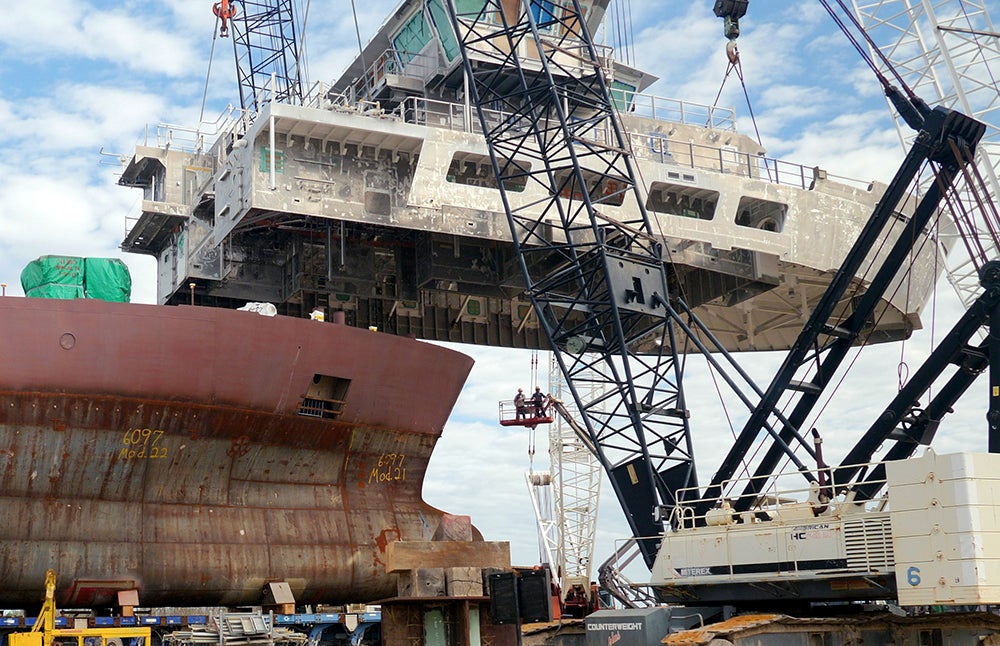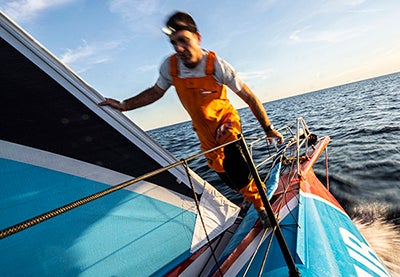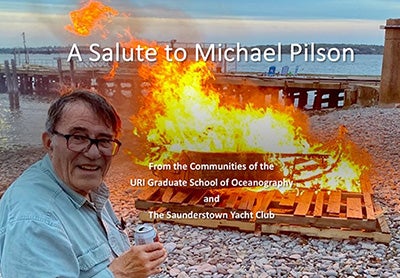
November 2023 — April 2024

Narragansett Dawn reaches a transformative milestone in April when, at Bollinger Shipyards in Houma, La., the aluminum superstructure is successfully married to the steel hull. The achievement marks an important step closer to delivery of this NSF-funded, regional class research vessel. Photo courtesy of Oregon State University’s project field office.


The 2023 Charles and Marie Fish Lecture, “Six Months Across the Ocean,” is given by Charlie Enright (right), the first American skipper to lead a U.S. team to victory and hoist the iconic trophy in The Ocean Race’s 50-year history. A book of the same name is a fascinating look into his racing experience and first-hand observations on the health of our ocean planet. He and the 11th Hour Racing Team endured six months of racing around the world—sailing seven legs, visiting four continents and traversing 32,000 nautical miles.
GSO researchers and The Nature Conservancy present “Changes in the Benthos: What the Seafloor Tells Us About the Health of Narragansett Bay,” a webinar in which Professor Jeremy Collie, graduate student Shaina Harkins and restoration scientist Heather Kinney discuss how changes in temperature and water quality have affected benthic biodiversity.
Demolition and removal of a cinder-block addition to Bunker A (Armistead Battery) of the old Fort Kearny begins. Built in the 1960s, the addition served as a lab for many years.

The annual End-of-Year Celebration is held on Knauss Quadrangle. With the theme “tropical island,” the event features entertainment by a steel-drum musician, fire pits, and a cozy tent with room for food, drink and party games.
In the webinar, “Drivers of Toxic Algal Blooms in Narragansett Bay,” Matthew Bertin, Ph.D., Gilles and Malvina Klopman Asst. Prof. of Chemistry at Case Western Reserve University, discusses recent findings about the drivers of this particular phytoplankton species in the bay and implications for future blooms.
Chowder & Marching sponsors the first-ever Winter Artisan’s Market. Held in Nautilus Galley, the market features pottery, prints, paintings, soaps, etc., made by students, faculty and staff crafters. Light snacks, warm apple cider and libations heighten the holiday spirit.
In San Francisco at the AGU 2023 Fall Meeting, URI President Marc Parlange, GSO Dean Paula Bontempi, and College of Arts and Sciences Dean Jen Riley host a reception and mixer for the many students, faculty and administrators attending the conference and alumni living in the Bay Area.

R/V Endeavor berths at Senesco Ship Repair Yard. Following the typical sand-blasting, painting, overhauls and inspections, she heads out for sea trials, returns to GSO then begins a 48th year of research cruises.
The interactive discussion, “Offshore Wind and the Ocean Environment,” is delivered in a round-table format. URI-GSO and Commercial Fisheries Research Foundation experts discuss the knowns and unknowns about the impacts of offshore wind on Rhode Island’s coastal waters and beyond.


In a packed Corless Auditorium, the GSO community salutes the 58-year career of Professor Emeritus Michael E.Q. Pilson (left). The celebration of his extraordinary legacy includes talks, limericks and photos that recap many of “MEQP’s” activities at GSO and at the Saunderstown Yacht Club. The event is followed by a reception in the Mosby Center and a special boat burning on South Ferry beach.
Construction of the Ocean Robotics Laboratory (ORL) begins as perimeter fencing is installed and preliminary sitework gets underway. Located in the heart of the Narragansett Bay Campus, ORL’s construction site will be a salient feature for several years to come.
The webinar, “MyCoast in Action, How MyCoast Photos Are Used for Planning and Restoration,” shares how photographs of coastal flooding and extreme high tides (taken and uploaded by thousands of volunteers around R.I.) help planning and restoration experts improve coastal resilience.

The NOAA CINAR Program is renewed for five years following a comprehensive scientific and administrative review.
Matthew Savoca, Ph.D, from Hopkins Marine Station, Stanford University, gives the lecture “Canaries in the sea? Baleen whales as sentinels of marine pollution.” Savoca studies anthropogenic change in marine systems through the lens of top predators. He also investigates how pollutants such as plastic debris and PFAS chemicals flow through pelagic food webs.
The lecture, “Communicating Science in a Crisis” is given by URI-GSO alumnus Chris Reddy, a senior scientist at the Woods Hole Oceanographic Institution and one of the world’s foremost oil-spill scientists. A reception and book-signing follows.

The 45th edition of an April Fools’ Day tradition, “Harpoon Seminar” entertains the Bay Campus community.
A special-guest lecture, “Unveiling the Invisible Threat: Fingerprinting of Environmental Contaminants in the Lesser Himalayan Lakes of Pakistan,” is given by Riffat Naseem Malik, Ph.D., a Fulbright Visiting Research Scholar working in Professor Rainer Lohmann’s laboratory. Malik is a tenured professor of enviromental sciences at Quaid-i-Azam University in Islamabad, Pakistan.
